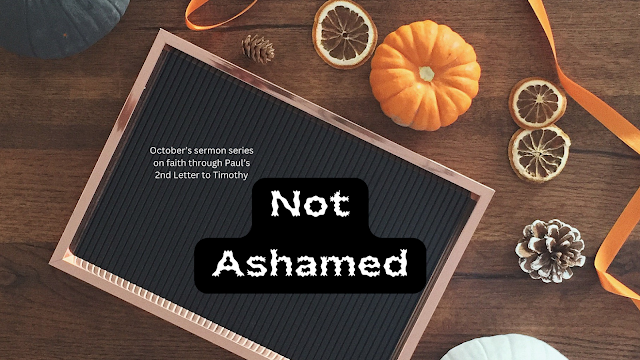What God Calls Clean - Acts 11:1-18 (Easter 5C)
How do you deal with change? I'm not trying to give you any subtext here... but just trust me. I'd like to think that I deal with change really well. Plenty of weird stuff has happened in my life that I've had to accept what is and adjust. But one that most of you could probably relate with... the night before Tadj was admitted to the hospital when Ali's due date had passed. Over the course of the next couple of days, which were kind of a blur, our family grew from two to three. We had anticipated becoming parents, and read all the books, thought we knew what to expect... but as we were leaving the hospital, like many people experiencing the same thing, thinking... you're just gonna let me leave with this thing? Driving away it's not like I had to show papers to anyone... the change over the next month or so was really more what it's about. Those late night and early mornings were quite a change to how free-wheeling and footloose we had been even the weekend before.
Don't get me wrong, there's been so much joy in becoming a parent. At the same time, there has been so much fear as well. Now, our story today has a lot about change and different people deal with it, which seems to be timely, since our world has lots of changes going on.
Caught in their Tradition
So back to Peter - he is traveling to Jerusalem (again) and he meets up with some fellow believers. But they are quick to criticize him - why are you eating dinner with THOSE people? No issue had been more debated by the early christians or more important to them than whether their faith was intended only for Jews or whether it was to include Gentiles while allowing them to be Gentile. What disturbed these believers was that fellowship, the association. But what was the actual accusation? That he ate with those Gentiles who had accepted God's word and spent time with them. This has strong vibes of pharisees saying "Hey Jesus - why do you eat with the tax collectors and prostitutes?" as in all three synoptic gospels.
Peter was telling a church of Jewish Christians in Jerusalem about what took place that led him to accept Gentiles (non-Jews) into the church. The Jerusalem church was critical of Peter. He had to give a clear, step-by-step description of what he had experienced. To discern or understand how accepting Gentiles into the church as the will of God was not easy. Peter himself had received the message three times. It was hard for Peter to grasp what had happened and it was hard for both Peter and the early church to discern the ways of God. It is still difficult for us today to understand God’s ways as being fundamentally different than our
ways. God’s ways have never been easy for followers of Jesus.
Now, Peter has been a master of conflict, and this is no exception. He can feel the stares, he realizes the air just got really thick and he knows needs to make a smart move. He starts telling a story, like Jesus would have done. He recounts a dream that a sheet was lowered from heaven with all sorts of animals on it. God spoke and told him to kill and eat the animals. But Peter, maybe thinking he was being tested, refused because the food was unclean, and it would "profane". Then he heard a voice tell him, "What God has made clean, you must not call unclean." This was repeated three times, which is important because the number three is a symbol of completeness for the Jewish people, and may have given those hearing the story pause of how to consider.
Stories, not arguments, change lives. Isn't that what we are doing here? We tell and re-tell the lessons and narratives that are part of our tradition from the beginning. Imagine if Peter would have taken the bait and started debating them. They may find themselves in a very different place, and he may not have been able to change their hearts. Peter could have angrily attacked them, "Is it fair that we keep the gospel to ourselves? Does God not also love Gentiles?" This could have gone on for days, I'm sure.
The Christian Jews who criticized Peter had been caught in their tradition of not being an open and welcoming community. They may still have the idea that they are the chosen people of God, set apart. Meanwhile, God is trying to do a new thing. God sees what humans are doing, trying to create walls where there doesn't need to be. Although we can be resistant to change, God is the one changing us from the inside out. We want God to work in our lives to become more like God.
Moving God's Way
What happened after they were confronted with the truth that these people were believers just like them? the Holy Spirit descended - just like Pentecost which we'll talk about in a few weeks. The key line is verse 17 - "If then God gave them the same gift that he gave us when we believed in the Lord Jesus Christ, who was I that I could hinder God?" Put a different way - if God gave grace to even people who I hated, who did I think I was to stop God?
Wow... now that's the good news. I really think that could have been the whole sermon today. The common experience all of us in this room and with believers all over the world have is the redemptive power of the cross, and each of our experiences with God's grace and mercy in our lives.
These skeptics were transformed from the witness of Peter of God's grace. Peter didn't actually DO anything. You know at the beginning I was saying that the confrontation was similar to the Pharisees with Jesus? That result was very different. The gospel writers don't get into anything of what happens after Jesus talks to the Pharisees. There was no transformation... with Jesus RIGHT THERE. It kind of flabbergasts me how that could happen, but I suppose God gave each of us free will, right?
Even reading this text preparing for this sermon, the text floored me. The actor here who is doing all the work is God. God acted first. Peter didn't "bring" anything to the Gentiles he was eating with - Peter was just having fellowship with equals, someone else who knows what the experience has been like. How comforting would that have been for those who were new believers?
The next question I have may be a scary one: Are there people or groups that we are, even unconsciously, excluding? There are so many who the church has labelled impure, such as LGBTQ+, people of color, women, people of other faiths, and so on. Are there any any communities that are truly out of bounds to the grace of God? Murderers? Pedophiles? People for Gun control? People who are against vaccines? Atheists? Social media influencers? I'm sure you could come up with different categories yourself as well. But - this is kind of the freeing moment. God does not discriminate those who are willing to repent and live into the life that God has planned for them.
This may actually affect the way we think about testimony. It can be scary to feel like you have to "evangelize" to people who may not want to hear what you have to say. This is why spiritual conversations can happen anywhere and at any time, and why it's important to listen to how the Holy Spirit is guiding the back and forth, and to lean into where the Spirit is leading. Evangelizing could just be listening to the Holy Spirit and telling the story of what God has done in your life, and how that's brought joy and hope to your world.
What would it mean to sit down and have dinner with these people, even all at once, and talk about how they are more similar to us, how God may be working in and through them (even whether they'll even acknowledge it or not). The church is at a difficult point in its history, but as much as I am nervous how it's going to shake out - I know two things: God is good, and I am not God. So many people get wrapped up in the belonging of the community, that we sometimes forget who we may be hurting in the process to close off others from joining in God's great vision of acceptance and inclusion versus judgment and separation.
God enables ordinary people to be witnesses to the gospel. This can be scary, because it relieves us of our excuses that we aren't enough, in some way - not gifted enough, not old enough, not young enough, not bold enough. God has always chosen ordinary people for extraordinary tasks - whether Moses, Abraham, Mary, or Peter himself! We can even see that from our opening hymn, spirit of the living God, fall afresh on me... break me, melt me, mold me, fill me. Guide me to be more like God.
The change that I experienced in my life when I became a parent could not have been anticipated. It has become a fundamental part of me. As Tadj and I talk about sometimes, those days before children are really foreign to us now because we are so removed from that experience. But not only that, I think if we had it back, we've been transformed forever because of it and so we cannot separate ourselves from this. I think that's the life of faith as well. We can never anticipate how overwhelming the love of God can be, and how fully we can be transformed through the Holy Spirit. We are witnesses to the power of the Spirit at work in the world, and we are invited to stand with any and all and declare them clean.
Amen.




Comments
Post a Comment